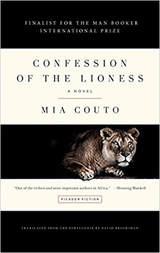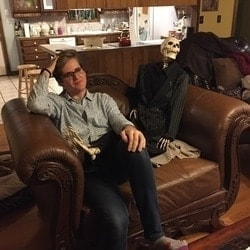Sacred Chickens
Menu
SACRED CHICKENS
 Confessions of the Lioness is a haunting, lyrical narrative told through the perspective of two journals, Mariamar Mpepe, a local woman who lives in the village, and Archangel Bullseye, a hunter who travelled there to kill the lions plaguing the village. Through these two diaries, the author juxtaposes the African Landscape against the pettiness and cruelty of the village where the novel takes place; however, one of the things I don’t like about lyrical poetry is that it’s meant to give an overall emotion or feeling, but rarely are there concrete images. At times, that’s what Couto’s writing felt like, especially toward the end, which took away from the rest of his excellent prose. Overall, though, it’s an enjoyable novel for the message that it presents and its unique take on anthropomorphizing lions. I knew that this novel was going to agree with me when I read the first line: “God was once a woman.” From there on, I knew that this was going to be a Feminist novel, and it is, just maybe not in the way I expected. Most of the novel deals with the oppression of women in Mozambique, Africa. Really, oppression is not a strong enough word. They are literally treated as animals. They are not allowed to look a man in the eye when they’re being spoken to, rape without prosecution is common, and in general women as seen and treated as sub-human. Throughout, we see examples of female characters comparing themselves to the living dead, or saying that they have not been alive in a long time. because, in truth, they aren’t living. Their existence as sub-human could hardly be called living. At the books core, it is a statement about women and equality, among other things. I think it is best summed up by this thoughtful quote: "My mother...used to complain that in Kulumani we were all buried. It was the opposite. We were drowned...All of us had been drowned before we were even born. At our birth, we were delivered onto the first beach we washed up on." Sadly, even though the women of that community are being oppressed by their culture, some of them are oppressing each other, a concept called internalized sexism. Much like internalized racism or homophobia, this is when a member of a minority or underprivileged group adopts the ideologies of the oppressors and enacts them against others in the community. For example, when it is revealed that Mariamar was sexually abused over a period of years by her father, her mother, Hanifa, goes into a rage, as anyone would. But, instead of directing her anger at the perpetrator, she physically assaults her daughter, blaming the victim instead of the person who actually committed the atrocity. Of course, this is not a foreign concept. Unfortunately, examples of victim blaming are seen all the time in the news, social media, or sometimes in a more personal area of our lives. However, while I love the message of the novel and some of its overarching themes, I felt that the author’s message was sometimes obscured by his writing, especially during the last twenty pages or so. While it’s true that reading his chapters is like sorting through terrain, the last section of the book was a little ridiculous. The poetic language became needlessly obscure. The conclusion offset the rest of his beautiful writing, making it difficult to determine what actually happened. The ending did not tie up the story in a bow, which is fine, but this compelling narrative deserved a conclusion. One of the things that I did like was the way the author played with the concept of lions and lionesses. In one her first encounters with the hunter, Hanifa, a lioness, asks him why he’s hunting lions in the forest when the real predators are in the village. She’s talking about the men, of course, and the rape culture they perpetuate. However, later in the book we see the women compared to lionesses, indicating their power over the men, because in a pride of lions, the females are usually the ones who act as providers. He turned the entire society in reverse with that metaphor. Gender is so important in this novel, but through that the author showcases how trivial it really is. The men in Mozambique place such a high value on their masculinity, yet they don’t see how fragile it really is. They, in essence, believe that because someone is either male or female, they have to act and behave a certain way. In other words, they have to perform their gender, and their gender is incumbent on a series of performances, otherwise they are a failure as a person and a member of the community. This is categorically not true. Societally yes, certain things are expected of men and women, but performing those roles is not what makes people male or female, and it doesn’t mean that they are required to do those things. While this may seem foreign when placed in the setting of a society halfway across the globe, the same thing happens in the United States. From the moment we are born, we are gendered, and we are taught how to, “be” a boy or a girl. It’s nothing more than a social construction, but it affects every area of our lives. Gender is one of those things that you can’t escape, but it doesn’t mean that you’re a failure as a person just because you may or may not conform to what’s expected of you. Gender bias, hatred and degradation of the feminine are at the heart of the misery in this story, but they’re also representative of a larger global issue with gender and gender equality. Overall, I really enjoyed this book. it was very short, but philosophical and thought-provoking. I loved and disliked the lyrical aspect to it, because it could either be insightful or irritating, but I don’t regret reading it. it demonstrates that some things are universally experienced, and even though this was set in Mozambique, I could relate to it, and I think that’s what makes great literature, that aspect of a shared experience and commonality.  Jarad attends Middle Tennessee State University, loves tea, and tries to spend every spare second reading. Jarad is majoring in English. Bless his heart! Let's all light a candle for him and send him happy thoughts!
0 Comments
Leave a Reply. |

Click Photo above to buy ebook or paperback from Amazon.
Here's the link to Barnes and Noble Or order through your favorite independent bookstore! Categories
All
|
 RSS Feed
RSS Feed